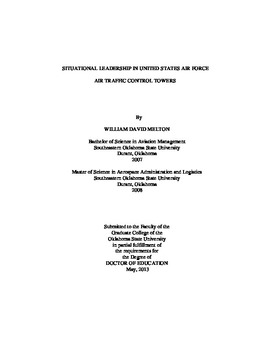| dc.contributor.advisor | Depperschmidt, Chad | |
| dc.contributor.author | Melton, William David | |
| dc.date.accessioned | 2014-09-24T14:16:36Z | |
| dc.date.available | 2014-09-24T14:16:36Z | |
| dc.date.issued | 2013-05 | |
| dc.identifier.uri | https://hdl.handle.net/11244/10974 | |
| dc.description.abstract | On December 17, 1903, the world as man knew it from the dawn of time changed. Orville Wright broke the bounds of Earth's gravity in controlled flight and in slightly more than a century that singular flight manifested into over 18 million annual worldwide flights. As the skies became more crowded it became necessary to develop a means to maintain safety, and the air traffic control profession was born. Developing into what is often considered one of the most stressful occupations, leadership in air traffic control facilities is critical the safe, orderly, and efficient flow of air traffic. The purpose of this qualitative study was to determine the preferred leadership style for United States Air Force air traffic control tower watch supervisors. A panel of 10 functional experts completed a 25 question, scenario based survey to establish a baseline for this study's four research questions. A purposeful sample of eight control tower chief controllers representing the eight United States Air Force major commands were interviewed and their responses were compared to the mean of the experts panel. The data from the interviews was analyzed and in addition to the straight forward responses to the research questions two themes emerged: the role of the monitor and apprentice controller's role in emergency situations. The study discovered that United States Air Force control towers are fully implementing the fundamentals of situational leadership. The eight interviewee's responses mirrored the expert panel's answers. The results of this study provide control tower chief controllers, watch supervisors, and future watch supervisors a frame of reference on how situations are handled across the spectrum of facilities. | |
| dc.format | application/pdf | |
| dc.language | en_US | |
| dc.rights | Copyright is held by the author who has granted the Oklahoma State University Library the non-exclusive right to share this material in its institutional repository. Contact Digital Library Services at lib-dls@okstate.edu or 405-744-9161 for the permission policy on the use, reproduction or distribution of this material. | |
| dc.title | Situational leadership in United States Air Force air traffic control towers | |
| dc.contributor.committeeMember | Key, James | |
| dc.contributor.committeeMember | Allen, Kevin | |
| dc.contributor.committeeMember | Marks, Steve | |
| osu.filename | Melton_okstate_0664D_12618.pdf | |
| osu.accesstype | Open Access | |
| dc.type.genre | Dissertation | |
| dc.type.material | Text | |
| thesis.degree.discipline | Applied Educational Studies | |
| thesis.degree.grantor | Oklahoma State University | |
